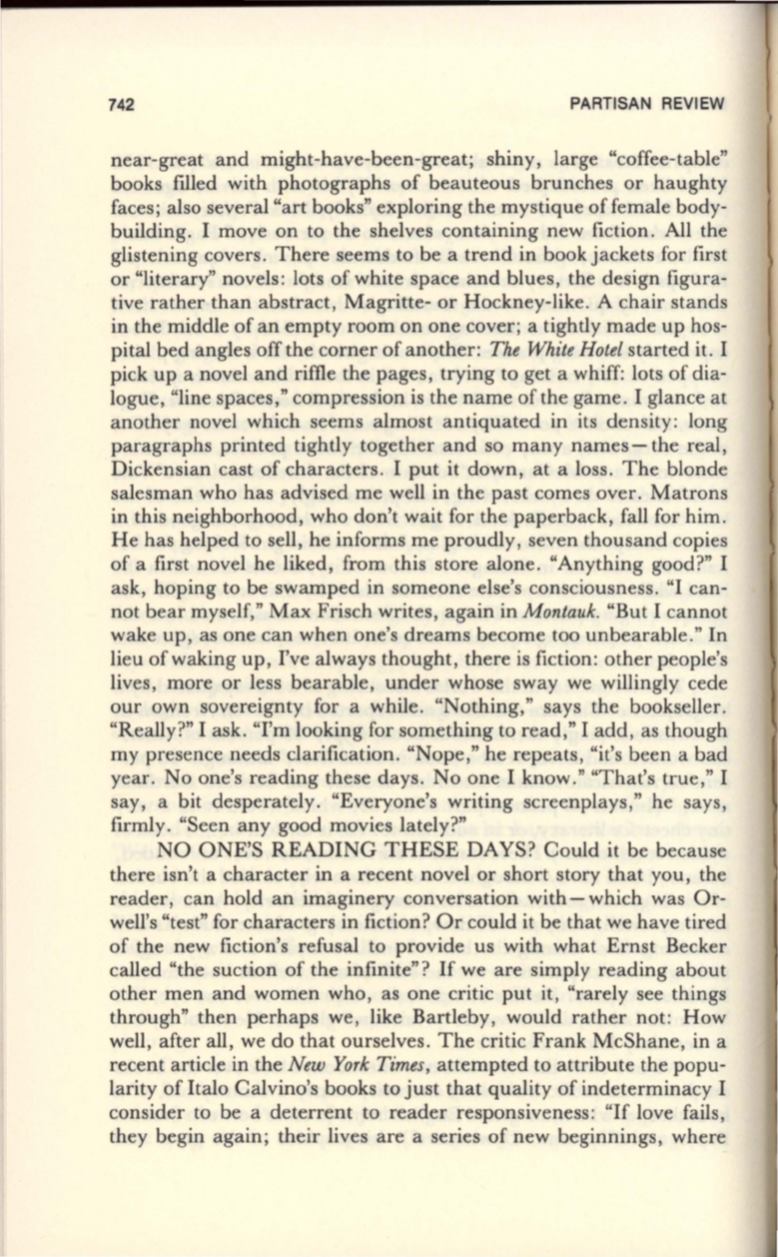
742
PARTISAN REVIEW
near-great and might-have-been-great; shiny, large "coffee-table"
books filled with photographs of beauteous brunches or haughty
faces; also several "art books" exploring the mystique of female body–
building. I move on to the shelves containing new fiction. All the
glistening covers. There seems to be a trend in book jackets for first
or "literary" novels: lots of white space and blues, the design figura–
tive rather than abstract, Magritte- or Hackney-like . A chair stands
in the middle of an empty room on one cover; a tightly made up hos–
pital bed angles off the corner of another:
The White Hotel
started it. I
pick up a novel and riffie the pages, trying to get a whiff: lots of dia–
logue, "line spaces," compression is the name of the game. I glance at
another novel which seems almost antiquated in its density: long
paragraphs printed tightly together and so many names-the real,
Dickensian cast of characters. I put it down, at a loss . The blonde
salesman who has advised me well in the past comes over. Matrons
in this neighborhood, who don't wait for the paperback, fall for him.
He has helped to sell, he informs me proudly, seven thousand copies
of a first novel he liked, from this store alone. "Anything good?" I
ask, hoping to be swamped in someone else's consciousness. "I can–
not bear myself," Max Frisch writes, again in
Montauk.
"But I cannot
wake up, as one can when one's dreams become too unbearable." In
lieu of waking up, I've always thought, there is fiction: other people's
lives, more or less bearable, under whose sway we willingly cede
our own sovereignty for a while. "Nothing," says the bookseller.
"Really?" I ask. "I'm looking for something to read," I add, as though
my presence needs clarification. "Nope," he repeats, "it's been a bad
year. No one's reading these days . No one I know ." "That's true," I
say, a bit desperately. "Everyone's writing screenplays," he says,
firmly. "Seen any good movies lately?"
NO ONE'S READING THESE DAYS? Could it be because
there isn't a character in a recent novel or short story that you, the
reader, can hold an imaginery conversation with- which was Or–
well's "test" for characters in fiction? Or could it be that we have tired
of the new fiction's refusal to provide us with what Ernst Becker
called "the suction of the infinite"?
If
we are simply reading about
other men and women who, as one critic put it, "rarely see things
through" then perhaps we, like Bartleby, would rather not: How
well, after all, we do that ourselves. The critic Frank McShane, in a
recent article in the
New York Times,
attempted to attribute the popu–
larity of Italo Calvina's books to just that quality of indeterminacy I
consider to be a deterrent to reader responsiveness:
"If
love fails,
they begin again; their lives are a series of new beginnings, where


